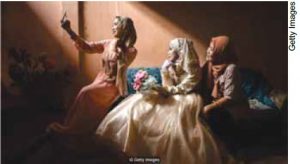Pronomes relativos – Simulado de Inglês
Você conhece os pronomes relativos do Inglês? Então que tal responder estas 10 questões sobre o assunto? Se errar tem uma aula pra você estudar e se preparar para o Enem!
Aproveite nossa aula em vídeo sobre pronomes relativos para refrescar sua memória sobre o assunto antes de encarar os exercícios do simulado. O professor Eduardo comanda o conteúdo:
Muito bem! Agora você está mais preparado para a prova e para usar os exercícios para estudar e fixar seus conhecimentos.
Pronomes relativos – Simulado de Inglês
Sumário do Quiz
0 de 10 questões completadas
Perguntas:
- 1
- 2
- 3
- 4
- 5
- 6
- 7
- 8
- 9
- 10
Information
.
Você já fez este questionário anteriormente. Portanto, não pode fazê-lo novamente.
Quiz is loading...
You must sign in or sign up to start the quiz.
Para iniciar este questionário, você precisa terminar, antes, este questionário:
Resultados
0 de 10 perguntas respondidas corretamente
Seu tempo:
Acabou o tempo
Você conseguiu 0 de 0 pontos possíveis (0)
| Pontuação média |
|
| Sua pontuação |
|
Categorias
- Sem categoria 0%
- 1
- 2
- 3
- 4
- 5
- 6
- 7
- 8
- 9
- 10
- Respondido
- Revisão
-
Pergunta 1 de 10
1. Pergunta
(IFBA/2018)
SUSTAINABLE TOURISM
1 Tourism is one of the world’s fastest 2 growing industries and is a major source of 3 income for many countries. Being a people- 4 oriented industry, tourism also provides 5 many jobs which have helped revitalise local 6 economies.
7 However, like other forms of development, 8 tourism can also cause its share 9 of problems, such as social dislocation, 10 loss of cultural heritage, economic dependence 11 and ecological degradation. Learning 12 about the impacts of tourism has led 13 many people to seek more responsible 14 holidays. These include various forms of 15 alternative or sustainable tourism such as: 16 ‘nature-based tourism’, ‘ecotourism’ and 17 ‘cultural tourism’. Sustainable tourism is 18 becoming so popular that some say that 19 what we presently call ‘alternative’ will be 20 the ‘mainstream’ in a decade.
21 All tourism activities of whatever motivation 22 – holidays, business travel, conferences, 23 adventure travel and ecotourism 24 – need to be sustainable. Sustainable 25 tourism is defined as “tourism that respects 26 both local people and the traveller, cultural 27 heritage and the environment”. It seeks to 28 provide people with an exciting and educational 29 holiday that is also of benefit to the 30 people of the host country.
Adapted from: http://www.unesco.
org/education/tlsf/ mods/theme_c/
mod16.html. Access on Jul 24th, 2017.Concerning grammar reference, mark the sentences below true (T) or false (F):
I. The relative pronoun which (Ref. 5) refers to economy.
II. The possessive adjective its (Ref. 8) refers to tourism.
III. The demonstrative pronoun these (Ref. 14) refers to people.
IV. The relative pronoun that (Ref. 29) refers to holiday.
Now, check the correct alternative below.
CorretoParabéns! Siga para a próxima questão.
IncorretoResposta incorreta. Revise o conteúdo nesta aula sobre pronomes relativos do Inglês para acertar na hora da prova!
-
Pergunta 2 de 10
2. Pergunta
(UEFS BA/2018)
‘I wish they could be saved’:
The victims of India’s poisonous dust

Silicosis, which kills thousands around the world, is caused by inhaling silica dust found in rock, sand, quartz and many building materials. It can lead to breathing difficulties, regular coughing, chest pains and, sometimes, tuberculosis and other chest infections.
Two years ago, at the age of 17, Urmila Yadav, from the village of Budhpura, located in the north-western state of Rajasthan, became one of the youngest certified cases of silicosis in India. Her case is singular; even in this village where mining and quarry1 work is the only occupation and silicosis is a commonplace disease that strikes almost every family, it is mostly men who are affected.
Rajasthan has been the epicentre of silicosis in India. The number of silicosis certified patients in the state, according to government data, is 8 441 (the figures are available up to April 2017). Actual numbers are likely to be much higher, claim advocacy groups. It is the only state to have a monetary relief mechanism for certified patients, in place since 2013; however, the onus is on workers to get a diagnosis and prove their occupational history, which is challenging in an unregulated industry like mining in India.
For a young teenage girl like Urmila to have silicosis is “quite an unusual case”, says Dr Vinod Jangid, responsible for diagnosing silicosis at the medical college in the district of Kota. There could be more children with silicosis but the government will hesitate to certify young people. “If children are diagnosed with silicosis, it means they are either living close to the mines, or they are working in the mines, both of which are illegal.”
Urmila began to work in the stone quarries next to her village in her childhood. It is common here for men to work in mines and for women and children to supplement the family earnings by carving cobblestones by hand. Most of them work in quarries and head back there after classes. “There are many girls in Budhpura who do this work. Some are 15 or 16 years, and some even younger. I wish they can be saved from this work,” Urmila says.
(Sunaina Kumar. http://www.bbc.
com, 09.10.2017. Adaptado.)1 quarry: an open excavation, usually for obtaining building material.
In the fragment from the last paragraph “There are many girls in Budhpura who do this work”, the word underlined can be correctly replaced by
CorretoParabéns! Siga para a próxima questão.
IncorretoResposta incorreta. Revise o conteúdo nesta aula sobre pronomes relativos do Inglês para acertar na hora da prova!
-
Pergunta 3 de 10
3. Pergunta
(UEFS BA/2018)
How the selfie has helped shape the 20th century

A photograph of a photograph – a wedding party in The Philippines take a selfie to note their special occasion The word ‘selfie’ may bring to mind an adolescent girl making duck faces at an iPhone, apparently unaware of her surroundings, or a daredevil 1 hanging off a skyscraper moments from death – symptoms of a self-obsessed culture and, some argue, the decline of society – but selfies have much deeper cultural implications that complicate those stereotypes. In her new book, The Selfie Generation, author Alicia Eler breaks with clichés to imagine the selfie as a double-edged sword, at once an empowering and vulnerable phenomenon, characteristic of the digital age.
In opposition to the assumption that selfies are objectifying or narcissistic, selfies have been key for empowering marginalised groups. Mass media at our fingertips created access to all kinds of characters, a new generation of individuals who aren’t as afraid to be different or unique. “Was there ever a time when adolescents weren’t obsessed with their own image?” asks Eler. Young or old, you can’t blame people for wanting validation, and now it’s just a tap away.
Since 2013, when ‘selfie’ was Oxford Dictionaries’ word of the year, these contemporary self-portraits have become omnipresent in an age when visibility can be synonymous with political power. Resistance and protest movements have taken on new forms since then. They’re less about marching with banners or community organising and more about decentralised fluidity or being seen across multiple online platforms. They are aimed at gaining visibility through a different logic – by using common images, tactics, hashtags, identity politics and iconic events.
(Devon V. H. Maldonado. www.
bbc.com, 15.01.2018. Adaptado.)1 daredevil: someone who enjoys doing dangerous physical things.
In the fragment from the second paragraph “a new generation of individuals who aren’t as afraid to be different or unique”, the underlined term could be correctly replaced by
CorretoParabéns! Siga para a próxima questão.
IncorretoResposta incorreta. Revise o conteúdo nesta aula sobre pronomes relativos do Inglês para acertar na hora da prova!
-
Pergunta 4 de 10
4. Pergunta
(UNESP SP/2017)
Examine a tira e o texto.

(http://lolalollipop.com. Adaptado.) Assinale a alternativa que completa corretamente a lacuna numerada no texto.
CorretoParabéns! Siga para a próxima questão.
IncorretoResposta incorreta. Revise o conteúdo nesta aula sobre pronomes relativos do Inglês para acertar na hora da prova!
-
Pergunta 5 de 10
5. Pergunta
(FATEC SP/2017)
Here’s how long you can work before your brain 1shuts down
I’m having a hard time starting this article. According to research out of the University of Melbourne, that might be because I’m middle-aged and work too much. Economists determined that burning the midnight oil makes you, well, dumber.” Our study highlights that too much work can have adverse effects on cognitive functioning,” they conclude.
Tell us something we didn’t know. Who hasn’t, at the end of a seemingly endless workweek, found themselves staring blankly at their computer screen or into space unable to remember what they had for lunch, let alone form a coherent thought about the task at hand?
For some employees, of course – the average resident 2 physician or, these days, that “3 gig economy” worker who makes ends meet by banging away at multiple projects – long hours are a fact of modern working life. And there’s a cost. Medical researchers have shown that working too much can affect employees’ physical and mental health.
So how much is too much? For people age 40 and older, working up to roughly 25 hours per week boosts memory, the ability to quickly process information and other aspects of cognitive function, according to the study, which drew on a longitudinal survey that tracks the well-being of 6,000 Australians. Beyond 25 hours a week, the middle-aged brain doesn’t work as well, the study indicates, noting that the findings apply to both men and women.
<http://tinyurl.com/j4os8ck>
Acesso em: 24.08.2016. Adaptado.Glossário
1 to shut down: parar de operar/funcionar.
2 physician: médico.
3gig economy: ambiente de trabalho baseado em empregos temporários e contratos de curta duração.
O pronome relativo that, em “that tracks the well-being of 6,000 Australians”, pode ser corretamente substituído, sem alteração do sentido original, por
CorretoParabéns! Siga para a próxima questão.
IncorretoResposta incorreta. Revise o conteúdo nesta aula sobre pronomes relativos do Inglês para acertar na hora da prova!
-
Pergunta 6 de 10
6. Pergunta
(UCS RS/2017)
The man in the white tunic
By Pico Iyer
1 When I stepped off the plane in Srinagar two years ago, I was eager to 2 celebrate Kashmir’s attempts to revive itself after more than 20 years of brutal 3 civil war. The Japanese, German and British governments had all recently 4 lifted their travel advisories against visiting the area, and although half a 5 million Indian soldiers remained – and more than 70,000 people had lost their 6 lives in Indo-Pakistani violence there since 1989 – all official talk was of the 7 future. That summer, 36 flights were touching down in Srinagar each day, 8 bringing 1.3 million Indians, often on pilgrimage, to a jewelled valley that has 9 long enchanted Moguls, British officers and backpackers.
10 Everywhere I turned, there were stories of rebirth. Altaf Chapri the owner 11 of the houseboat hotel to which John Bealby, my tour guide, took me, had 12 had to escape the region overnight when fighting broke out, leaving his 13 studies unfinished and arriving in New Delhi with his brother and only a few 14 wrinkled rupees in his pocket. Yet after going on to open two highly successful 15 boutique hotels in Kerala, he had returned to Kashmir to try to bring all he 16 had mastered – gourmet food and rainforest showers, wi-fi connections and 17 sundeck concerts – to the area in which he’d grown up. Almost everyone I 18 met spoke of flight from the region – followed by a hopeful return.
19 But the moment that changed me came one sunny morning, near the 20 centre of Srinagar, when Bealby led me around the colourful and aromatic 21 shops along the lake. We stopped to take a look at Suffering Moses, a store 22 that had been dazzling visitors with its papier-mâché boxes since a century 23 before my parents first visited, in 1941. We stepped into Asia Crafts next 24 door, _________ silver-tongued Kashmiris unrolled carpets that seemed to 25 change colour every time they were turned upside-down. Then, in the same 26 block, we climbed an unlit set of stairs, and found ourselves in a dusty room 27 full of sepia-tinted photos of Kashmir, and decades-old cameras.
28 “I’m so happy someone is interested in these things,” said the elegant 29 proprietor, Jagdish Mehta, his spotless white tunic matching his thatch of 30 white hair, and his language as formally beautiful as a Tennyson poem. 31 He whipped a black hood off a stand-up wooden camera, its 1938 receipt 32 from Glasgow neatly tucked into its sides. He pointed out ancient photos of 33 Kashmiris in formal dress and showed us black-and-white images printed 34 on silver gelatine paper. “We have a picture here of a queue of 40 or 50 35 Englishmen waiting to come in to have their photographs developed,” he 36 went on. Mahatta Photo Studio had been in the family since his grandfather 37 founded it in 1915.
38 Caught up in the magic of the scene – in the air of revival I was hoping to39 take home with me, the quiet magnetism of the man – I asked him what he 40 thought of the prospects of Kashmir. He looked at me and looked at me, then 41 walked to a far off corner of the near-empty room, standing for many long 42 moments with his back to us, completely silent. When he came back, I could 43 see his eyes were red. “I’m sorry,” he said, wiping his face with the heel of his 44 palm. “It’s very sad.”
45 He recalled the days when he and his friends used to dive into Dal Lake 46 and collect the pieces of bread their parents threw into it. Now, he said, the 47 water was so polluted, you could not even dip your hand in it.
48 “Will your son take over this shop one day?” I asked. He looked at me 49 and said nothing, as if unable to say, “No. This is all finished now.”
50 I encountered many beautiful things in Kashmir: the wooden mosques at 51 the centre of Srinagar, pointed out by a South Indian who had lost her heart 52 to them; the call to prayer interlace from a thousand mosques every evening 53 at dusk; the celebrated Mughal gardens. Most of all, I found myself lulled into 54 the gentle, seductive rhythm of life on the lake, paddling past the birds when 55 I wanted to buy snacks from a grocery store on stilts among the lotus ponds.
56 But when I returned home it was Jagdish Mehta that I remembered, if 57 only because he spoke for so many other souls I’d met in places like Lhasa 58 and Havana and Pyongyang. I travel in part to see what can never be caught 59 on YouTube or in headlines, and the proprietor’s silence, his turning away, 60 reminded me of why it’s so urgent to meet cultures in the flesh.
Disponível em:<http://www.bbc.com/travel/story/20150408-the-man-in-the-white-tunic>
Acesso em: 10 jul. 16. (Parcial e adaptado.)Escolha a alternativa que completa adequadamente a lacuna do texto na referência 24.
CorretoParabéns! Siga para a próxima questão.
IncorretoResposta incorreta. Revise o conteúdo nesta aula sobre pronomes relativos do Inglês para acertar na hora da prova!
-
Pergunta 7 de 10
7. Pergunta
(UNIRG TO/2017)
Read part of Adele’s song “Million years ago”.
I know I’m not the only one
Who regrets the things they’ve done
Sometimes I just feel it’s only me
Who can’t stand the reflection that they see
I wish I could live a little more
Look up to the sky not just the floor
I feel like my life is flashing by
And all I can do is watch and cry
I miss the air, I miss my friends
I miss my mother, I miss it when
Life was a party to be thrown
But that was a million years ago
(Available on: http://www.azlyrics.com/lyrics/adele/millionyearsago.html
Accessed on: May 5th, 2017.)Read the sentence taken from the song. Choose the only correct option considering the use of the relative pronouns.
CorretoParabéns! Siga para a próxima questão.
IncorretoResposta incorreta. Revise o conteúdo nesta aula sobre pronomes relativos do Inglês para acertar na hora da prova!
-
Pergunta 8 de 10
8. Pergunta
(UNITAU SP/2017)
Assinale a alternativa que preenche CORRETAMENTE as lacunas.
- The man________ spoke to you is Brazilian.
- The book ________ is on the table is very old.
CorretoParabéns! Siga para a próxima questão.
IncorretoResposta incorreta. Revise o conteúdo nesta aula sobre pronomes relativos do Inglês para acertar na hora da prova!
-
Pergunta 9 de 10
9. Pergunta
(Centro Universitário de Franca SP/2016)
Students Cannot Multi-Task with
Mobile Phones and Studying
There is bad news for students who like to use their mobile phones while they study. New research shows that students do not learn very well when they are texting and checking their social media accounts. The study, called “Mobile Phones in the Classroom: Examining the Effects of Texting, Twitter, and Message Content on Student Learning,” looked at 145 American university students in the classroom and tracked the responses and results of students watching a lecture on a video, and then taking notes and answering questions, while facing a series of interruptions on their internet- connected mobile phones.
Some of the students were asked “irrelevant” questions about their social life while others were sent links and questions relevant to the lecture content. Still some other students watched the lecture without interruptions. Afterwards, they were tested via multiple choice questions to see how much information they had retained and, out of that, how the presence of online distractions had affected their ability to retain and process information. Although the study concluded that the use of mobile phones definitely produced lower results, students who were sent relevant material were affected less negatively than those whose messages had a more social focus.
Jeffrey Kuznekoff, the head researcher, said that one of the biggest challenges teachers have in the classroom is the non-stop battle of keeping students working. He said many students felt they needed to be online and checking messages even when they had important work to do in class. The researchers said it is very common for students to be physically present in class, but mentally absent because they are using their mobiles. Kuznekoff said teachers were fighting a “losing battle” because students were more interested in social media than learning.
A study of a similar nature, conducted by the London School of Economics in four English cities, found that banning mobile phones produced a 6% increase in marks in schools. As the debate in the UK continues over the role of mobile devices in class, these results could be influential. “It is a common occurrence to observe students who are physically present, yet mentally preoccupied by non- course- related material on their mobile devices,” said the US researchers, who eventually concluded that it was the lowest- achieving students who were most at risk of succumbing to the distraction of mobile phones.
(www.breakingnewsenglish.com / http://www.huffingtonpost.co.uk. Adaptado.)
In the fragment from the last paragraph “it was the lowest-achieving students who were most at risk of succumbing to the distraction of mobile phones.”, the word in bold could be replaced, with no change in the meaning of the sentence, by
CorretoParabéns! Siga para a próxima questão.
IncorretoResposta incorreta. Revise o conteúdo nesta aula sobre pronomes relativos do Inglês para acertar na hora da prova!
-
Pergunta 10 de 10
10. Pergunta
(Fac. Direito de Franca SP/2016)
CIVIL-CRIMINAL LITIGATION
http://www.law.umich.edu/clinical/generalclinic/Pages/
caseexamples.aspx. Acessado em 21/10/2015. Adaptado.It took nine years and a lot of work going to US Courts of Appeals, for nearly 40 clinic students to stop the deportation of a mentally retarded man who had come to the United States with his family at age 14 and lived here for 33 years. At the final hearing, the immigration judge restored the client’s permanent resident status. Students are now helping the client gain U.S. citizenship.
Na terceira linha do texto, a palavra “who” refere-se
CorretoParabéns! Siga para a próxima questão.
IncorretoResposta incorreta. Revise o conteúdo nesta aula sobre pronomes relativos do Inglês para acertar na hora da prova!
Sobre o(a) autor(a):
Ana Cristina Peron -
Gostou? Compartilhe!
Continue lendo:
Aqui vão 2 publicações relacionadas que talvez você goste:

Aulão Enem de Espanhol e Inglês: revisão intensiva para a prova
Por Melina Zanotto | 15 de outubro
Assista ao Aulão Enem de Espanhol e Inglês do Curso Enem Gratuito e revise os conteúdos mais importantes para a...

Interpretação de textos em questões de Inglês no Enem
Por João Vianney dos Valles Santos | 18 de abril
Confira com o professor Guilherme Plucênio, do Curso Enem Gratuito, as dicas especiais para você mandar bem nas questões de...


